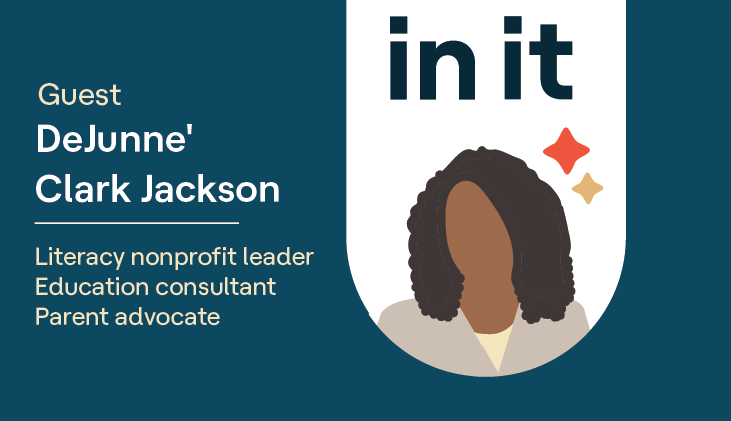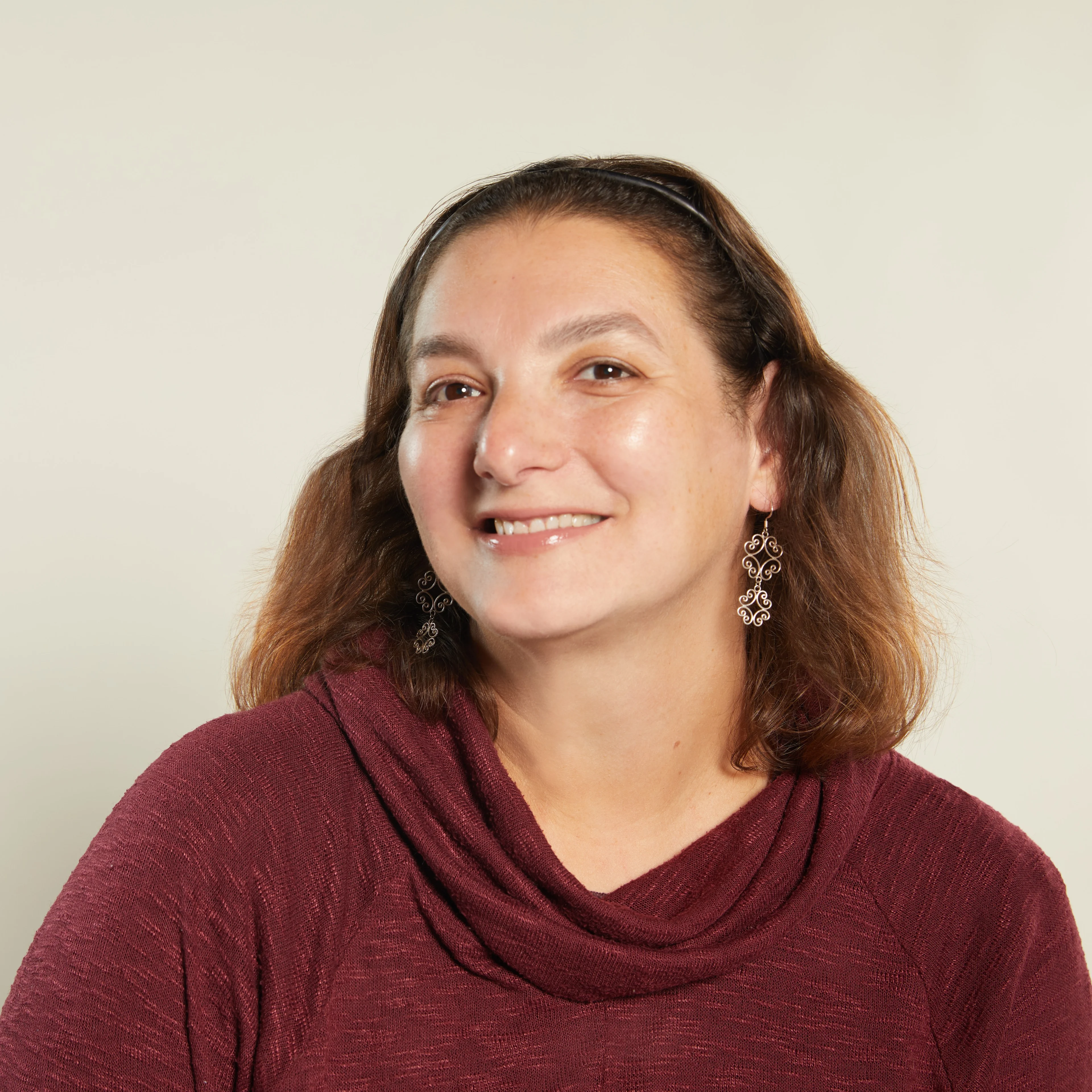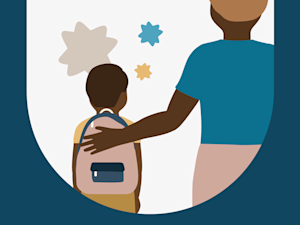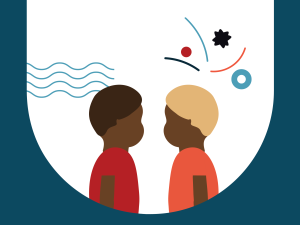How to make the most of parent-teacher conferences

Stay in the know
All our latest podcasts delivered right to your inbox.
If you have a ton of questions for your child’s teacher — but only 15 minutes to discuss them in a parent-teacher conference — you’re not alone. How can you make the most of this meeting?
In this episode, hosts Gretchen Vierstra and Rachel Bozek get advice on how to prepare for parent-teacher conferences from DeJunne’ Clark Jackson. DeJunne’ is a parent advocate, an education consultant, and president of The Center for Literacy & Learning. She’s also a parent of two who’s proudly earned the badge of “five-inch binder mom.”
Hear how DeJunne’ prepares herself — and her kids — for parent-teacher conferences. Learn how she approaches the conversation with facts, not feelings. And get tips for helping your child talk with you about school.
Related resources
Episode transcript
Gretchen: From the Understood Podcast Network, this is "In It," a podcast about the ins and outs…
Rachel: …and ups and downs…
Gretchen: …of supporting kids who learn and think differently. I'm Gretchen Vierstra, a former classroom teacher and an editor here at Understood. And before we do anything else, I want to introduce you to my new co-host, Rachel Bozek. Rachel, welcome.
Rachel: Yay, thank you! I'm really happy to be here.
Gretchen: So, I know you as a writer and an editor who's done some work for us that Understood. But you're also a mom to kids with learning and thinking differences, right?
Rachel: That's right. I am. My two kids are in fourth grade and eighth grade and they both have ADHD. So, that's something that we're navigating and learning about every day at home and at school.
Gretchen: So, today we are talking about parent-teacher conferences. And I don't know about you, Rachel, but when I see those words on the school calendar, I used to kind of feel worried and overwhelmed. Now that my kids are a little older, not so much, and maybe that's not a good thing. But for a lot of families, parent-teacher conferences are stressful. What do you think?
Rachel: I think they can be. And I also think they sometimes are a little stressful and worrisome for the kid. I remember as a kid feeling this kind of sense of doom. I always felt like I was waiting for my parents to get back with some like, "So, we talked to your teacher."
Gretchen: Totally!
Rachel: But for me, I feel right now when we get that kind of, you know, heads up that conferences are coming, I'm kind of like, "OK, now we're in the year."
Gretchen: Yeah. And, you know, since I'm a former teacher, I want to just say that like, I know the doom and gloom thing, but I also want families and kids to be excited, right? Because it's a time to start building relationships, which is why I'm so excited that today we're speaking with someone who has a lot of useful tips and insights to share on this topic.
Rachel: Yes. DeJunne' Clark Jackson is a former classroom teacher, school counselor, and student advocate and is now the president of the Center for Literacy and Learning, a nonprofit supporting teachers who teach reading. And she's a parent herself. DeJunne', welcome to In It. We're so glad you're here.
DeJunne': Thank you for having me.
Gretchen: OK. So, DeJunne', are Rachel and I alone in feeling our blood pressure go up just a little bit at the mention of parent-teacher conferences?
DeJunne': You are most certainly not alone.
Gretchen: OK.
DeJunne': Because it is quite, not always, but can be quite overwhelming.
Rachel: So, I want to start with the basics. What is a parent-teacher conference for some families who may have not experienced a conference before? What is it for and what is it not for?
DeJunne': A parent-teacher conference is just a school-based meeting, and it's centered around your child's progress. Usually, like Gretchen mentioned, you see it on the calendar, so it could be mid-quarter or mid-semester, but they can be requested at any time. The meeting itself, the duration of the meetings, can vary, but it's not meant to be very long. The bottom line is it's a conversation. It's not just a listening session. It is an active dual role that we share with our child's teachers.
Gretchen: Yeah, and you're right that for your typical school, it's probably a really quick conversation. So, if you're the parent of a child who learns and thinks differently, is this the place to review your child's IEP or 504 plan?
DeJunne': The two aren't mutually exclusive. You can't have a meeting about your child's progress in the classroom without discussing those things that exist on the IEP or the 504 plan because they exist within that space. It's different in the way that a typical IEP meeting or a 504 meeting involves lots of parties.
Gretchen: Yes.
DeJunne': You show up to that space and there's a table full of folks. I have, so my child has been through the IEP process since diagnosed in third grade. My kiddo is dyslexic and ADHD and we have been on this journey for quite some time. We are now a freshman in high school, so I have been a member, and I say that because as a parent I am a member of that team and I have a voice. And I always say, like, if you've survived and I mean that an IEP meeting, then a parent-teacher conference is a breeze. IEP meetings can be really daunting. And so, parent-teacher conferences give you an opportunity to be lighter in that space.
Rachel: Yeah. And I think one thing that makes parents and caregivers nervous about these meetings or kind of gives them this real anticipation for the parent-teacher conference, I mean, is that we're not always sure if or how much we should prepare, right? So, what's your advice on figuring out like how much to bring with us, especially knowing that there are definitely time constraints? — whether the conference is 7 minutes for middle school or 15 or 20 minutes maybe for grammar school.
DeJunne': So, I'm wearing sort of two hats, like your regular parent-teacher conference with a child who doesn't have, you know, an IEP or a 504. But if your child does, like mine, I am known as the five-inch binder mom. And I wear that badge proudly. I have in my binder my son's history throughout his schooling, all his evaluations, parent-teacher conference notes, his test scores. So, all of those things, when I'm having a conversation with a teacher about his progress, those things are important to bring to the table. That conversation is rooted in that information. And so, you should absolutely prepare how much you prepare for, you know, it's individualized. Depends on, you know, where your child is, especially if a child doesn't have any — my youngest is eight and we have been very fortunate to not have our hands on him as much as my oldest — and so, my parent-teacher conferences with his teachers look different. And I show up to those meetings with barely a thing in hand. And I'm just there to mostly listen about how he's doing and anything that I can contribute to how he's doing. And so, your preparation is very, you know, dependent on your own child situation.
Gretchen: You're the one-inch binder mom for those, right? Sort of half an inch.
DeJunne': I think I’m the spiral notebook mom for those.
Rachel: You know, as you get ready for that, you know, like just what I was mentioning earlier that I used to feel nervous or just this kind of like sense of anticipation or anxiety or something, knowing that my parents were going into a conference. So, do you talk to your kids beforehand or like give them kind of a heads up so that they're not worried about what's happening when you go in there?
DeJunne': Yeah, and that's part of that preparation process. One of the steps that I take is to set those expectations, right? This may involve explaining why you're meeting, like kids, no matter how old, may not have an understanding of like, "Why are you going to talk to my teacher? What did I do?" Like, "What happened?" And so, just to know that it's a regular occurrence and that all families are invited to that meeting, that it's not about what you did wrong or what you're not doing. And because of my line of work and what I do and how I do it, my kid would always have this like deep sigh followed by an eye roll when I share with him that I'll be meeting with his teachers. But by opening up to him about the nature of the meeting and what I intend to share at the meeting and what I expect to get out of the meeting, he doesn't have to sit and wait with bated breath to know what's going on, because I involve him in that process is so important for his well-being that he understands and is aware and is involved.
Rachel: Yes.
DeJunne': One of the things I do to prepare my son for our meetings — in addition to like letting him know that it's going to happen — it's really leaning into what he feels that these meetings are going to be centered around, the conversations are going to be centered around, and really allow him to formalize his own ideas, then that may even help me discover where he thinks he is, not where his teacher sees where he is, not where I think he is, but really where he's gauging his progress and then allow him to tell me what he would like me to ask. Oftentimes, no matter how much I try to push self-advocacy, my kid particularly really respects his teachers to the point where if he feels like he's going to ask a question that teeters the line of disrespect, he will fall back and he will not, you know, stand up. And so, as his advocate, I want to be his voice in that space. So, yeah, I allow him the opportunity to share this experience with me.
Gretchen: That's awesome.
Rachel: What if I have concerns about how my child is doing socially? Is that something that is kind of fair game for the conference? Is that OK to talk about, you know, within the parent-teacher conference or is it should we really be focusing just on academic performance?
DeJunne': Focus on all the things. So, parents should raise concerns about whatever is going on that they feel that they want an update about. A child shows up to school as a whole child and you don't take off your social development hat when you step into the classroom and only wear your academic hat. And so, parent-teacher conferences are an opportunity to discuss your child's progress in all areas. You know, the good, the bad, and the ugly. And all of those areas are inclusive of their academic performance, their social development and interaction with their peers, their interaction with their teachers, the ability to follow directions, their emotional development, which is huge. All of those are part of the evaluation process. So why should we not include that in our conversations with our child's teacher?
Gretchen: Makes a lot of sense.
DeJunne': I have to put in this disclaimer, not all parent-teacher conferences are built around talking about your child's lack of progress.
Gretchen: Right.
DeJunne': There should absolutely be conversations about the wonderful progress your child is making.
Rachel: So, when we're at home talking with our child and, you know, everything seems like it's going fine, and, you know, we ask like, "How's everything going at school?" I'm trying to, you know, make sure I ask the right questions at your conference. And the child is like, "It's fine" or "Nothing,” which is sometimes what I get, I'm like, "Really, nothing?" What happens when we get to that conference and we find out that, you know, there's an area where the child is struggling, whatever it is, if we're kind of taken by surprise, right? Once we get there. What should we do with that information? And then how should we go about approaching it with the child afterward?
DeJunne': Look, I think I may be the president of that club of "fine," the fine club. How was your day? "Fine." And so, yes, that the ability for your child to be open and have dialog about their progress, you know, daily before we get to that space, is a struggle. But then to enter into that parent-teacher conference space and discover that things are not as they seem or as they are being reported, that's why it is so important for parents to have direct communication, consistent communication with their child's teachers. And that is not because you don't believe your child, or your child isn't being truthful with you. It's because they hadn't really developed the ability to inform you of all the things. This is a very important point to make, especially for our students with executive functioning challenges, because by the time they get to you, at the end of the day, it's not that they don't want to share their day, it's so much has happened,
Rachel: They're done.
DeJunne': where do I start?
Gretchen: Right.
DeJunne': What do I start with? Do I tell you how my day ended, how it started, or what the middle of the day was like? And so, I give my child permission to, "It's OK. 'Fine' is OK." And so, part of that preparation for those meetings, like we talked about before, is it's sort of drawing out those specifics of their concerns that they may have not being able to share with me daily. And so going into there and having this discovery and not putting the blame on your child, because "You didn't tell me" and "This is what I found out."
Gretchen: Right.
DeJunne': You know, they don't want to have that burden of "I didn't remember to tell you and I didn't mean to keep it from you. I just didn't know when or how or who." And so, permission is so important as we have and are developing our kids to be participants in this space. But if we, as the parent, open that line of direct communication because we already know how our child is going to come to us or the information that will get lost in translation, then we can own that communication. And it's so important to have that built in. And as a matter of fact, I have direct homeschool communication built into my child's IEP because I already know I'm not going to find out the things through him.
Gretchen: So, what about if you go to a conference and you feel like the teacher is just not getting your child, or you and the teacher are just not seeing eye to eye on something? How should parents handle that?
DeJunne': Oh, man, it is so difficult, right? And it's so hard as a parent going into a parent-teacher conference, you know, because it's such an emotional process, right? 'Cause this is your baby that we're talking about. And it's so important for our voices to be heard, but it's also important for us to listen and lean into what the teacher is saying. Because just like your experiences are valid for what's going on in your setting, your teachers' experiences need to be listened to and validated as a part of their experience. And so, when I talk to parents about how to manage this process and navigate the school systems, I have a saying that says we lead with facts and not feelings. And this doesn't mean that feelings don't exist, because they most certainly do, and you have permission to feel all the feels. But when we are talking about trying to get to a solution, then we want to lead with facts. So, no matter if I, you know, me and the teacher are, you know, brunch buddies or if we are just here to take care of business, we have to keep my child, the student, at the center of why we're doing what we're doing and leave our feelings to the side. And that is so hard. But we have to lead with our head and those facts and usually, we can find common ground in that.
Gretchen: I love that. And I, you know, as a former teacher myself, I, sometimes I worried about going into a conference and feeling like I might have something tough to share with a family that I'm only just finding out and that's why we're just going to talk about it now. And I would worry that it wouldn't go so well because it's got a lot of emotions involved. And so, focusing on the facts is a really helpful piece of advice.
Rachel: Yeah. And I've found it also really helpful to pretty explicitly say to the teacher that I want to hear about even the bad stuff. I have definitely had the experience where I've been in a conference and heard something that's not even necessarily surprising because most of the things I've, you know, had most of the conversations I've had with teachers about my kids are things that I already know about them. But like, "Oh, so this is going on in the classroom" and I'll start to cry. I have started to cry in so many conferences and you know, the teachers have been wonderful. They just kind of give you a minute, hand over some tissues, and like we just continue the conversation. But it's hard. It's hard to hear that stuff, but like it is so important to know where they're coming from. You know, they're not here to make us feel bad, but sometimes we hear stuff that makes us feel bad.
Gretchen: So, once the conferences are over, regardless of how it goes, how do we continue that conversation with the teacher?
DeJunne': So, the follow up can be twofold. It can involve just something as simple as just sending a thank you note or emails, like just to send a thank you note for having the opportunity to talk with the teacher — although we, you know, it's built in — but, you know, you want to thank the teacher for meeting with you and then following up on any action items that were discussed or simply checking in to see how your child is doing with those things that you guys discussed. I personally like sending a summary. I know, I'm so extra. I like sending a summary of my meeting notes to the teacher just because I, in my processing, I want to make sure that we heard the same thing, that we're on the same page. And so, that follow-up "Here are the things that we talked about, and here are action items. Please let me know if I've missed anything or misunderstood any information. Feel free to offer corrections, revisions, updates, additions," and it builds both the relationship with the teacher and the parent, but it also builds a system of accountability. You all are there with the same goal in mind, and so you want to keep each other accountable for the things that you agreed on.
Gretchen: One follow-up to this. So, how are you continuing the conversation with your child? So, if you started this, right? by asking, "Oh, what am I going to expect in this meeting? What do you want me to ask about?" You go to the meeting, your kid's at home waiting, right? If they don't come to the meeting with you. So, what do you say when you come home?
DeJunne': Yes, absolutely. So, that follow-up not only involves the teacher, and that's a great point, but to follow up with them pretty immediately, you know, as soon as you know, you get home and you get things settled, you go, "Hey, can I share with you how the meeting went? " You know, and it's important for you to spend that specific time, maybe over dinner or some family time, to talk about those things that were discussed and then talk about the responsibility that your student owns in that space. Because sometimes we put everything on the teacher and the teacher has to wave this magical wand and fix all the things. And then as parents, we want to take on all of that and we want to fix all the things. But sometimes we leave the child out. It's that student's responsibility. I cannot do your homework for you, although I might. But sometimes we have to just get through or, you know, just. "I can't be in the classroom with you. It's your journey. I am here as a supportive part of this process and you have to own it because we want to build independent adults who can think, who can act, and who can empathize." And so, it starts with the school journey. So, yes, let them own their stuff and give them the things that they can carry, and you carry the things that you need to. And the teacher does his or her part. And that's how we work harmoniously to get you across the stage.
Gretchen: Oh, my gosh. I love it. Thank you so much for joining us on "In It," DeJunne'. It's been great.
DeJunne': Thank you for having me.
Gretchen: Yeah, seriously. You've been listening to "In It" from the Understood Podcast Network.
Rachel: This show is for you. So, we want to make sure you're getting what you need, and we want to hear from you. Email us at init@understood.org to share your thoughts. We love hearing from you.
Gretchen: If you want to learn more about the topics we covered today, check out the show notes for this episode. We include more resources as well as links to anything we mentioned in the episode.
Rachel: Understood.org is a resource dedicated to helping people who learn and think differently discover their potential and thrive. Learn more at understood.org/mission.
Gretchen: "In It" is produced by Julie Subrin. Briana Berry is our production director. Justin D. Wright mixes the show. Mike Errico wrote our theme music.
Rachel: For the Understood Podcast Network, Laura Key is our editorial director. Scott Cocchiere is our creative director and Seth Melnick is our executive producer. Thanks for listening.
Gretchen: And thanks for always being in it with us.
Hosts

Gretchen Vierstra, MA
is the managing editor at Understood and co-host of the “In It” podcast. She’s a former educator with experience teaching and designing programs in schools, organizations, and online learning spaces.

Rachel Bozek
is co-host of the “In It” podcast and the parent of two kids with ADHD. She has a background in writing and editing content for kids and parents.
Latest episodes
April 25, 2024
Learn about common reasons families might look for a special education attorney and what their other options are.

April 11, 2024
Learn ways to advocate for your child at school while maintaining a good relationship with their teachers.

March 28, 2024
The track and field gold medalist shares her story and talks about ADHD, dyslexia, and building confidence.

March 14, 2024
The hosts interview kids’ book author Lindsey Rowe Parker. She talks about her new picture book about sensory differences in kids.

February 29, 2024
Understanding what a language disorder means for your child can be overwhelming. Here’s help from an expert.

February 15, 2024
Talking with your child about their diagnosis of a learning and thinking difference can be tough. Get advice from an expert.

February 1, 2024
How can you manage the challenges of having one child who learns and thinks differently and one child who doesn’t? Get advice from an expert.

January 18, 2024
Any sibling relationship can be hard to manage. But what happens when one of the siblings has a learning or thinking difference? Here’s one mom’s story.

January 4, 2024
Overwhelmed by talking with your child’s pediatrician about ADHD or learning differences? These tips can help.

December 14, 2023
Tantrums and meltdowns are challenges all parents face. Get tips for projecting calm when kids and teens have tantrums.